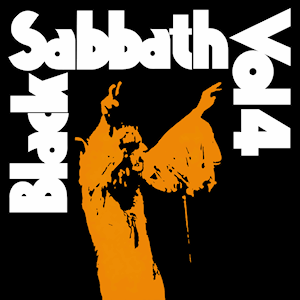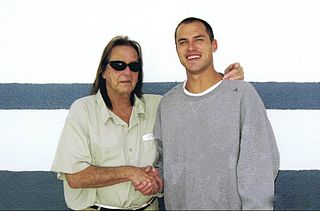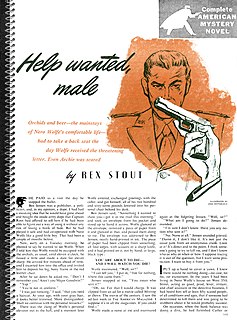Related Research Articles

Stranger in a Strange Land is a 1961 science fiction novel by American author Robert A. Heinlein. It tells the story of Valentine Michael Smith, a human who comes to Earth in early adulthood after being born on the planet Mars and raised by Martians, and explores his interaction with and eventual transformation of Terran culture.

Vol. 4 is the fourth studio album by English rock band Black Sabbath, released in September 1972. It was the first album by Black Sabbath not produced by Rodger Bain; guitarist Tony Iommi assumed production duties. Patrick Meehan, the band's then-manager, was listed as co-producer, though his actual involvement in the album's production was minimal.

George Jacob Jung, nicknamed Boston George and El Americano, was an American drug trafficker and smuggler. He was a major figure in the United States cocaine trade during the 1970s and early 1980s. Jung and his partner Carlos Lehder smuggled cocaine into the United States for the Colombian Medellín Cartel. Jung was sentenced to 70 years in prison in 1994 on conspiracy charges, but was released in 2014. Jung was portrayed by Johnny Depp in the biopic Blow (2001).

Adler Berriman "Barry" Seal was an American commercial airline pilot who became a major drug smuggler for the Medellín Cartel. When Seal was convicted of smuggling charges, he became an informant for the Drug Enforcement Administration and testified in several major drug trials. He was murdered on February 19, 1986 by contract killers hired by the cartel.
Brian O'Dea is a Canadian businessman, author, television personality, and former drug smuggler. He is best-known for a large marijuana smuggling enterprise he masterminded in the mid-1980s. Set up to move marijuana in bulk from Southeast Asia to the Pacific Northwest and California, between 1986 and 1988, O'Dea's organization successfully smuggled 76 tons of marijuana worth about $300 million into Washington, transported it to California, and distributed it throughout the United States.

Carlos Enrique Lehder Rivas is a German-Colombian former drug lord who was co-founder of the Medellín Cartel. He was released from prison in the United States after 33 years in 2020. Born in Armenia, Colombia, Lehder eventually ran a cocaine transport empire on Norman's Cay island, 210 miles (340 km) off the Florida coast in the central Bahamas.

The Murder at the Vicarage is a work of detective fiction by British writer Agatha Christie, first published in the UK by the Collins Crime Club in October 1930 and in the US by Dodd, Mead and Company later in the same year. The UK edition retailed at seven shillings and sixpence and the US edition at $2.00.

They Came to Baghdad is an adventure novel by Agatha Christie, first published in the United Kingdom by the Collins Crime Club on 5 March 1951 and in the United States by Dodd, Mead and Company later in the same year. The UK edition retailed at eight shillings and sixpence (8/6) and the US edition at $2.50.
Doc McGhee is an American music manager, best known for working with hard rock bands Kiss, Bon Jovi and Mötley Crüe. The latter two groups experienced their rise to stardom under his management. He has also worked with Hootie & the Blowfish.

The United States Central Intelligence Agency (CIA) has been accused of involvement in drug trafficking. Books and investigations on the subject that have received general notice include works by the historian Alfred McCoy, professor and diplomat Peter Dale Scott, journalists Gary Webb and Alexander Cockburn, and writer Larry Collins. These claims have led to investigations by the United States government, including hearings and reports by the United States House of Representatives, Senate, Department of Justice, and the CIA's Office of the Inspector General.
Snowblind or Snow Blind may refer to:

Snowblind: A brief career in the cocaine trade written by American author Robert Sabbag in 1976 is a non-fiction account about a character named Zachary Swan who turned his hand to smuggling cocaine from Colombia into the US. Set in the 1970s before organised crime took over the cocaine trade, it is based primarily in New York City and Bogotá and features a variety of colourful characters. Unlike other smugglers at the time Swan concocted a vast array of scams designed both to evade customs officials and protect his 'employees' from prosecution, all of which are highly imaginative and entertaining.

Banged Up Abroad is a British documentary/docudrama television series created by Bart Layton that was produced for Channel 5 and that premiered in March 2006. Most episodes feature stories of people who have been arrested while travelling abroad, usually for trying to smuggle illegal drugs, although some episodes feature people who were either kidnapped or captured while they were either travelling or living in other countries. Some episodes have featured real-life stories that first became well known when they were made the subject of a film: films that have been 're-made' in this way include Midnight Express, Goodfellas, The Devil's Double, Argo, Mr Nice and, to a lesser extent, Casino.
Ronald Keith Siegel was an American psychopharmacologist who was an associate research professor in the Department of Psychiatry and Biobehavioral Sciences at the University of California, Los Angeles. Siegel was the author of several noted studies and books on psychopharmacology, hallucination, and paranoia. A native of Herkimer, New York, he received his B.A. in sociology from Brandeis University and his Ph.D. in psychology from Dalhousie University. He was affiliated with the Albert Einstein College of Medicine at Yeshiva University before joining the research faculty of UCLA in 1972, where he remained until his retirement in 2008. Throughout his career, he was a consultant to several government commissions on drug use. His research focused on the effects of drugs on human behavior, including numerous clinical studies in which human volunteers took drugs such as ketamine, LSD, marijuana, mescaline, psilocybin, and THC.

Air New England Flight 248 was a De Havilland DHC-6 Twin Otter that crashed on approach to Barnstable Municipal Airport in Barnstable County, Massachusetts, on 17 June 1979. All of those on the aircraft survived with the exception of the pilot, who was killed instantly.

Kevin Abraham Sabet is a former three-time White House Office of National Drug Control Policy advisor, having been the only person appointed to that office by both a Republican and Democrat. He is also an assistant professor adjunct at Yale University Medical School, a fellow at Yale's Institution for Social and Policy Studies, and a columnist at Newsweek.

"Help Wanted, Male" is a Nero Wolfe mystery novella by Rex Stout, first published in the August 1945 issue of The American Magazine. It first appeared in book form in the short-story collection Trouble in Triplicate, published by the Viking Press in 1949.
Mickey Munday is an American former drug trafficker and former associate of Colombia's Medellin Cartel during the growth phase in cocaine trafficking, 1975–1986. Munday was featured in the 2006 Rakontur documentary, Cocaine Cowboys.

Lenard Larry McKelvey, known professionally as Charlamagne tha God or simply Charlamagne, is an American radio host and television personality. He is a co-host of the nationally syndicated radio show The Breakfast Club with DJ Envy and Angela Yee; all three were inducted into the Radio Hall of Fame in 2020 for their work on the show. He also hosts the late-night talk show Hell of A Week with Charlamagne Tha God on Comedy Central.

The cocaine boom was a stark increase in the illegal production and trade of the drug cocaine that first began in the mid to late 1970s before then peaking during the 1980s. The boom was the result of organized smugglers who imported cocaine from Latin America to the United States, and a rising demand in cocaine due to cultural trends in the United States. Smuggling rings of Cuban exiles organized trade networks from Latin America to Miami that streamlined the import of cocaine to the United States. Americans also began favoring less of the drugs popular in the 60s counterculture such as marijuana and LSD, and instead began to prefer cocaine due to a mystique of prestige that was developing around it. This increase in cocaine trade fueled the rise of the crack epidemic and government sponsored anti-drug campaigns.
References
- 1 2 3 Down Around Midnight, Viking Press, New York, 2009
- 1 2 3 4 Sabbag, Robert. "State of the Reunion." Rolling Stone, 19 August 1993, p. 57
- 1 2 3 "Works- Robert Sabbag". Robert Sabbag. Retrieved 17 September 2013.
- ↑ Sabbag, Robert. "The Ultimate College Reunion," The New York Times, 6 June 1998
- ↑ Sabbag, Robert. Snowblind: A Brief Career in the Cocaine Trade, Avon Books, 1978
- ↑ Hunter S. Thompson, promotional quote provided by Thompson for the original 1977 hardcover edition of Snowblind, in a letter to Bobbs-Merrill dated 27 September 1976
- ↑ The New Yorker book review, 21 March 1977, p. 139
- ↑ Robert Stone, promotional quote provided by Stone for the 1990 Random House reprint edition of Snowblind, in a letter to Random House dated 14 July 1989
- ↑ Anthony, Andrew. "The Coke Dealer's Handbook." The Observer, 20 September 1998, p. 3